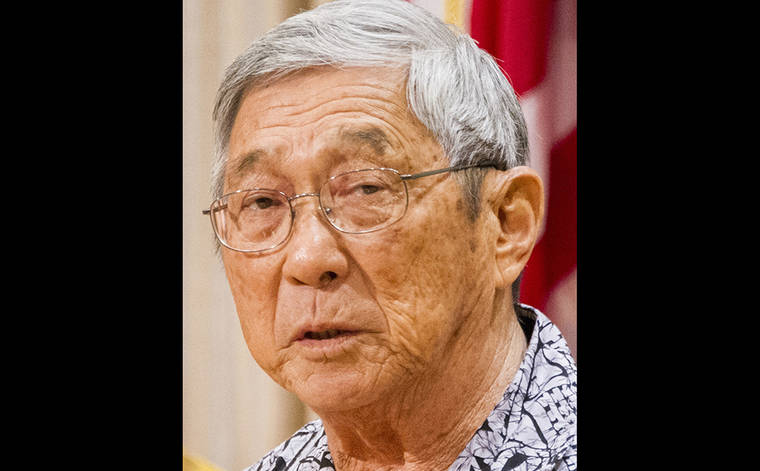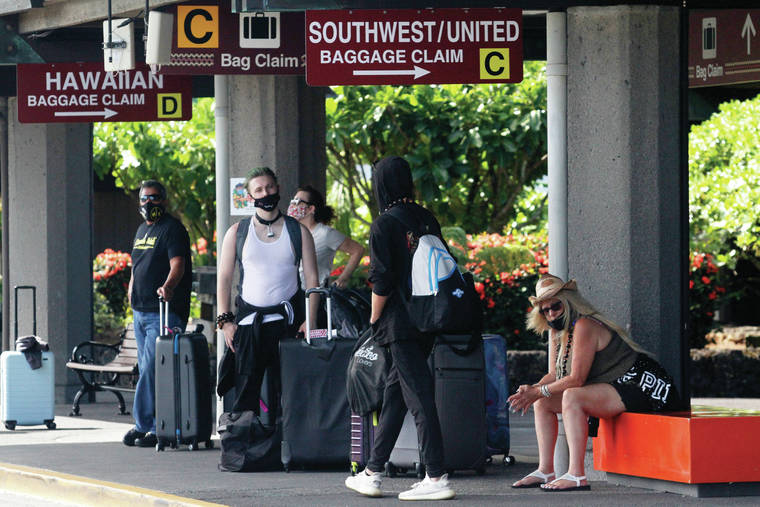Kim: ‘I need your help’

KIM

Kelsey Walling/Tribune-Herald file photo Travelers wait for their rides Oct. 15 after arriving at Hilo International Airport.
Mayor Harry Kim told an online conference of island and state visitor industry leaders Friday that he fears what happens when the federal coronavirus funds expire next month and the potential impact on tourism.
Mayor Harry Kim told an online conference of island and state visitor industry leaders Friday that he fears what happens when the federal coronavirus funds expire next month and the potential impact on tourism.
Kim, who’ll leave office Dec. 7 when Mayor-elect Mitch Roth is inaugurated, noted rising COVID-19 numbers in Hawaii and in mainland states — naming California, Texas and Arizona.
ADVERTISING
“There are … problems we’re going to face come Dec. 15,” Kim said. “… We’re told the National Guard is going to pull out because of funding. I need your help … because you’re very influential people. I’m a has-been in three weeks.”
Kim said he wants Hawaii’s congressional delegation to know his concerns about what happens when the federal funds expire or are depleted.
The visitors have increased from a trickle prior to Oct. 15 because of to the state’s 14-day quarantine of arriving trans-Pacific passengers to 7,787 arriving passengers in the state’s airports Thursday, including 932 in Kona.
To avoid the quarantine, arriving trans-Pacific passengers must receive a negative COVID-19 test from one of the state’s testing partners prior to departure for Hawaii. Hawaii Island alone has required arriving trans-Pacific passengers pass an antigen test, which usually provides results within 15 minutes. Those who fail are required to take a polymerase chain reaction, or PCR, test at the airport and are required to quarantine until a negative result is received, usually within a day or so.
Kim announced Friday that funding and space issues at Ellison Onizuka Kona International Airport have made 100% testing of arrivals unsustainable and the county now plans to test 25% of arrivals there.
“The importance of this testing is unchanged. The goal is to secure funding and go back to full testing of everyone under the state pre-test program,” Kim said.
Some visitor industry officials have said one reason Kona’s arriving vacation numbers have lagged well behind Maui’s is because of the second test required by county authorities. The number of arriving passengers in Kona stating Thursday that they were there for vacation was only slightly more than a third of those Maui arrivals with the same intentions.
There were new COVID-19 cases on the Big Island on Friday, and Kim told the officials that Kona’s been “the epicenter now for the past couple of weeks.”
He said the second test of passengers is to protect not only the community but also the hotel guests and workers. He told the officials — including John De Fries, president and CEO of the Hawaii Tourism Authority, and Mufi Hannemann, CEO of the Hawaii Lodging and Tourism Association — that Kona hotels were turning away guests with reservations who had tested positive on the antigen test and were quarantined while awaiting results of a PCR test.
“What did we have to do? Transfer them to a hotel that we find for them and pay for that!” Kim said, addressing De Fries. “So why are we paying the price, John? Would that hotel rather have this person go straight to the hotel (infected), not knowing it and mingling with all the rest of the guests in the common areas and the workers? They look at this as, ‘Whoa, you take care of this. It was your program.’
“Where am I gonna get the money, John? Where is the cooperation of the one business that we’re trying to save? Would they rather have these … people in their hotels (when) nobody knows who got infected until they left and went back home, but left behind the virus?”
Hannemann, a former Honolulu mayor, told Kim his complaint was “bothersome to me, and I assure you that I will get to the bottom of it.”
“We have said to all our hotels, all the resorts that belong to HLTA, we are to take care of that individual, even if that person has tested positive for COVID, until a doctor, a physician says he or she needs to be released from that lodging property,” Hannemann said. “… We should not be saying no to a person that has a reservation at that hotel, at that lodging. They’re supposed to accept them, even if they … have tested positive.
“That’s the policy that we’ve accepted. And I want to make sure that we comply across the board.”
Email John Burnett at jburnett@hawaiitribune-herald.com.


